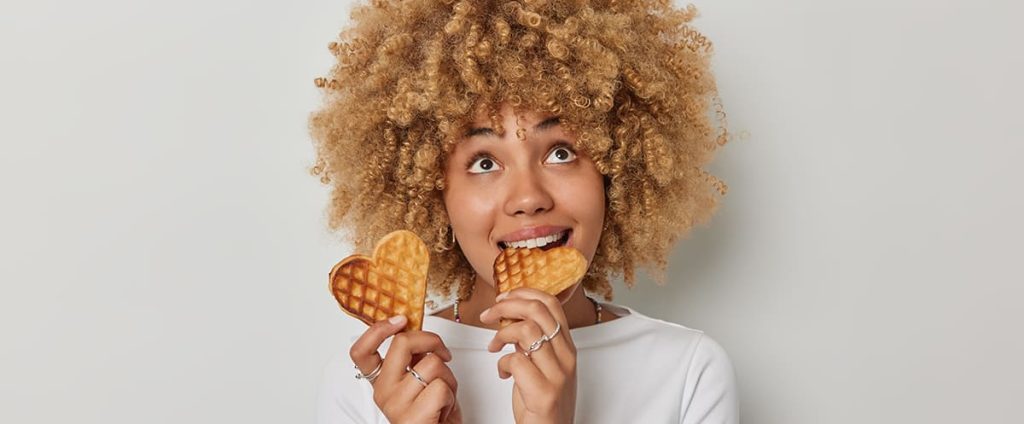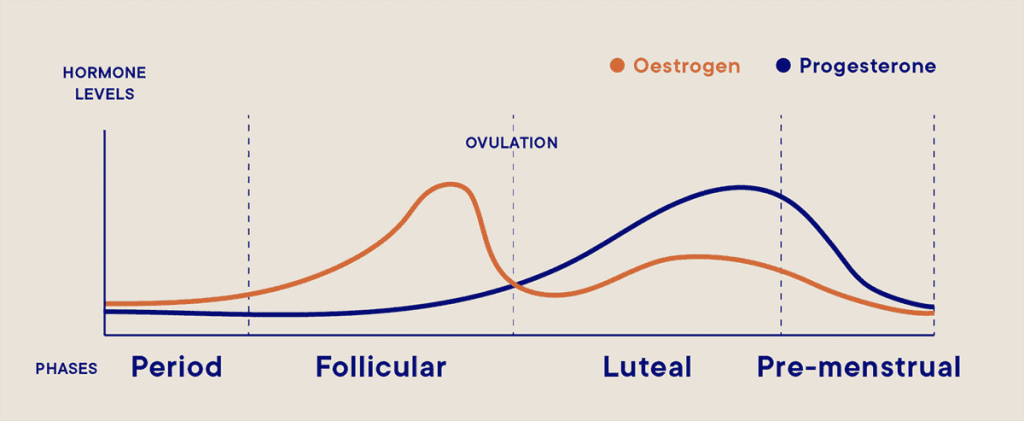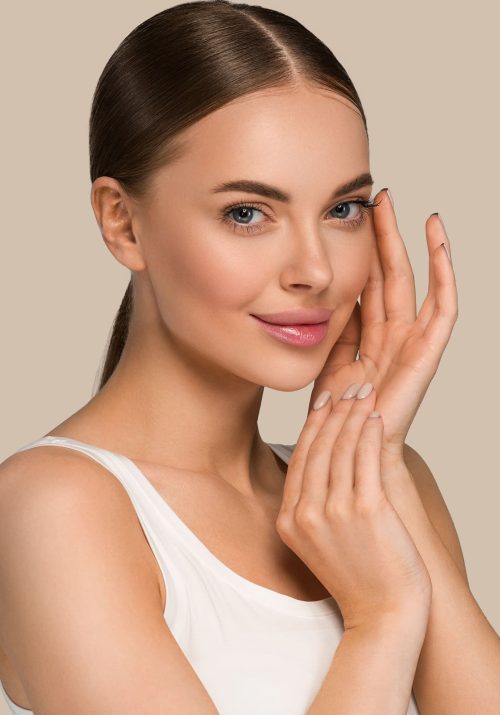If you are reading this post, it means you have the same problem that I used to have for so many years and you want to know how to stop period cravings for good or, at least, to make them less intense. Keep reading because you are at the right place!
I had severe pms cravings in the pack due to my PCOS, and it literally was ruining my life! I tried my best to eat health, go to the gym and keep myself in shape for most part of the time. But every month a week before my period I got so crazy food cravings that I couldn’t stop myself from overeating. I gained weight, water retention and felt so out of control.
So I totally feel you! And I hope the tips from this article will really make a difference in your life too.
*
Most common period cravings

Some of the common psychological and behavioral symptoms associated with PMS include depression, changes in appetite, fatigue, mood swings, irritability, sleep disturbances, and tension. In addition to these symptoms, many women also experience food cravings during this time. They may suddenly crave certain foods that they don’t normally desire during the rest of the month.
If you’re someone who experiences intense food cravings before your period, you’re not alone. Many women feel like they have little control over their food choices during this time. However, it’s important to understand what causes period cravings, when they typically start, and how to manage them.
By learning about the underlying factors that contribute to period cravings, you can take steps to reduce their intensity and frequency. Making dietary changes, practicing stress-reduction techniques, and engaging in regular physical activity are just a few strategies that can help manage PMS symptoms, including food cravings.
Overall, while PMS can be a challenging and uncomfortable condition for many women, there are effective ways to manage its symptoms and improve your overall well-being during this time.
*
Main reasons of period cravings
- Female Hormones. Some studies have shown that due to changes in levels of female hormones (estrogen and progesterone) you may experience cravings for high-carb and sweet foods before your period.
- Vitamin/Mineral deficiency. Research has suggested that PMS is associated with low dietary intake of some select vitamins or minerals.
- Serotonin drop. During the luteal phase of a female cycle, serotonin (chemical that responsible for your sense of happiness) drops which can explain why we crave bad foods to make ourselves feel better during PMS.
During menstruation, a woman’s body undergoes physiological changes that cause hormonal imbalances and lead to food cravings. These cravings typically occur during the luteal phase of the menstrual cycle, which can begin up to two weeks before the actual start of menstruation.
During the luteal phase, the levels of estrogen and progesterone fluctuate, which can cause several side effects that are part of premenstrual syndrome (PMS).

What exactly happening with hormones during this stage:
Once ovulation has taken place, the ovary’s corpus luteum cells release progesterone and a small amount of estrogen. This hormonal surge causes the lining of the uterus to thicken in anticipation of pregnancy. If pregnancy does not occur, the corpus luteum dies, progesterone levels drop, and the uterus lining sheds, leading to the start of menstruation.
Some studies suggest that PMS symptoms can happen because of insufficient amount of progesterone or falling levels of this hormone. Check my article “Fix low progesterone and get your period back with PCOS!” because it was a life-changing strategy for me!
*
How to stop period cravings
VITAMINS

According to this research, certain vitamin and mineral supplements may help ease PMS, including period cravings.
Vitamins B, vitamin D, calcium, and magnesium have been identified as the most essential for balancing PMS symptoms.
Magnesium is crucial for synthesizing dopamine in the brain. Dopamine imbalance can impact mood and lead to feeling sad, overwhelm and anxious. Period cravings, especially for sweet foods, can occur when dopamine levels decrease right before the start of period.
In one study, oral supplementation of 360 mg of magnesium three times a day starting on the 15th day of a woman’s cycle reduced some PMS symptoms.
Low levels of Calcium in the luteal phase of the menstrual cycle have been found to cause a lot of PMS symptoms. A study found that women who took 500 milligrams (mg) of calcium carbonate twice a day for three months experienced less fatigue, fewer changes in appetite, and less depression than those women who did’t take it. That’s why it’s a good idea to add calcium supplements to your routine or to opt for food naturally rich in calcium (dairy, sesame seeds, almonds, sardines etc).
To reduce period cravings, aim for up to 1,200 mg of calcium daily.
Vitamin D is another vitamin that is super important if you want to stop period cravings. It helps reduce inflammation, improve immunity and balance progesterone levels which can manage your appetite.
Taking a minimum of 2,000 IU vitamin D daily can help reduce PMS cravings, and for those with PCOS, this dose can be increased to 5,000 IU.
Vitamin B is believed to be involved in various steps of serotonin metabolism, including converting tryptophan amino acid to serotonin and generating the active substances required for serotonin metabolism. B6 and B12 vitamins, in particular, are essential. One study showed that increasing the daily intake of vitamin B6 can raise progesterone levels and balance estrogen enough to improve symptoms of PMS.
Aim for a daily dose of 1.4 mg of vitamin B6.
Note:
To really see improvements, try to take these supplements throughout your whole cycle, rather than just in your luteal phase.
FOODS

Here are some diet recommendation you should follow if you want to stop pms cravings:
- Keep your gut healthy. Hormones like estrogen and progesterone are elevated during the luteal phase of the menstrual cycle. It’s important to have a proper balance of these hormones. Paying attention to the gut microbiome, including gut bacteria, can help achieve this. Bad gut bacteria can upset hormone balance by reactivating estrogen, meanwhile good gut bacterias assist in metabolising excess estrogen and eliminating it from the body. Make sure you take probiotic supplements or eat enough fermented foods like sauerkraut, coconut yogurt, kimchi, miso, kombucha etc.
- Consume good fats. Healthy fats are important for maintaining hormonal balance and a healthy menstrual cycle. Include foods like avocado, salmon, virgin olive oil, chia seeds, and almonds in your diet.
- Increase fiber intake. Fiber-rich foods are complex carbohydrates that take longer to break down and absorb, thus reducing cravings. Whole-grain breads and cereals, legumes, fruits, and starchy vegetables are great sources of complex carbs. Try to get around 25 grams of fiber every day.
- Consume more protein. Protein helps moderate blood sugar imbalances and slows down the digestive process, making you feel full for longer periods. Choose protein options such as eggs, chicken, turkey, fish, or peanut butter and include them in every meal or snack.
STRESS MANAGEMENT

To stop PMS cravings, it’s important to understand how the luteal phase affects your mood. During this phase, serotonin (a “happy” hormone) levels drop while cortisol (“stress” hormone) levels increase, leading to negative emotions such as stress, anxiety, irritation and frustration. These emotions can make you crave comfort foods, especially those high in sugar and carbohydrates, as they temporarily boost serotonin levels.
That’s why in order to stop period cravings, you should be aware of this process and prepare to support yourself emotionally.
Try taking tryptophan. One way to help offset the decline in serotonin is by taking tryptophan supplements or consuming foods rich in this amino acid (such as turkey, soybeans, skim milk, or pumpkin seeds). Additionally, research shows that herbal remedies such as saffron can help manage food cravings and lift the mood.
If you’ve notice that your period cravings have mostly emotional reasons, you may find helpful to try a therapy or journaling. I recommend using a free food diary from this amazing guide.
Choose right exercises. During the luteal phase, it’s common to feel less motivated and have lower energy levels, making it important to choose the right form of exercise.
Low-impact workouts such as walking, yoga and pilates can help relax your mind and move your body in the most gentle way. Leave higher intensity workouts for the follicular and ovulation phases.
Overall, I would recommend trying to reduce stress as much as possible during this phase. For me it looks like prioritizing my self-care, working of improving the quality of my sleep, reducing or eliminating alcohol during the luteal phase, and even limiting caffeine (read, coffee) in order to avoid any additional stressors. I’ve noticed that even these small things can increase my pms cravings and delay period.
*
Extra advice from me
I’ve noticed that even when we know what steps we should take in order to solve our problems, we still don’t do it (because we forget, or get distracted or don’t have enough self-discipline). I’m the same! That’s why I’d like to share with your a couple of hacks that help me:
- Make a box with all the supplements that you should take for your condition. I took a simple box and put in it all the vitamins I need for my pms cravings. Place in a visible place (on your kitchen counter or a dining table) so you can’t forget to take it.
- Set a reminder on your phone for 1-2 weeks before the start of your period. Then you’ll get a notification that you should pay extra attention to healthy eating, choosing gentle exercises, taking calming herbs etc. This will ensure that you’ll cut out your pms cravings before they even start.
As a recap
According to studies, there are a number of factors that can contribute to period cravings.
One of the key factors is the hormonal changes that occur during the menstrual cycle. Specifically, imbalance between progesterone and estrogen have been linked to intense PMS symptoms, including food cravings.
Another factor that may contribute to pms cravings is the level of serotonin in the body. Serotonin is a neurotransmitter that is responsible for mood regulation, and low levels of this chemical have been linked to increased cravings for carbs and sweets. This is because the body uses carbs to produce serotonin, so when levels are low, we may crave carb-rich foods like potato chips or pizza.
In addition to hormonal changes, stress can also play a role in pariod cravings. Cortisol, the hormone that is released in response to stress, tends to spike right before your period, which can exacerbate cravings for comfort foods.
In order, to beat the cravings effectively, try to incorporate the recommendations I’ve provided above (focusing on supplements, healthy foods and stress management) and let me know what you think!
If you find this post useful, please share it using the social media links below.
xo,
Jane



Leave a Reply